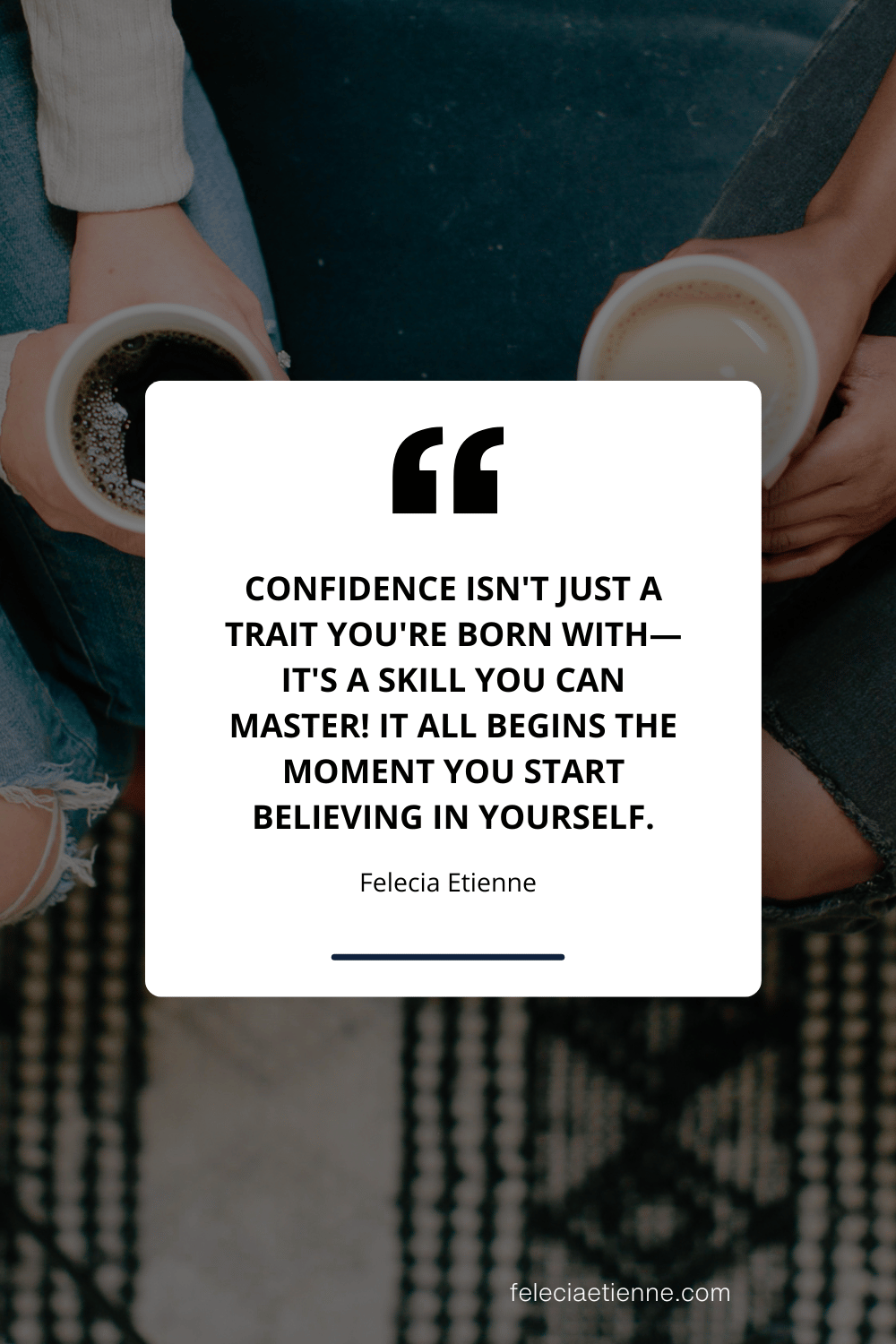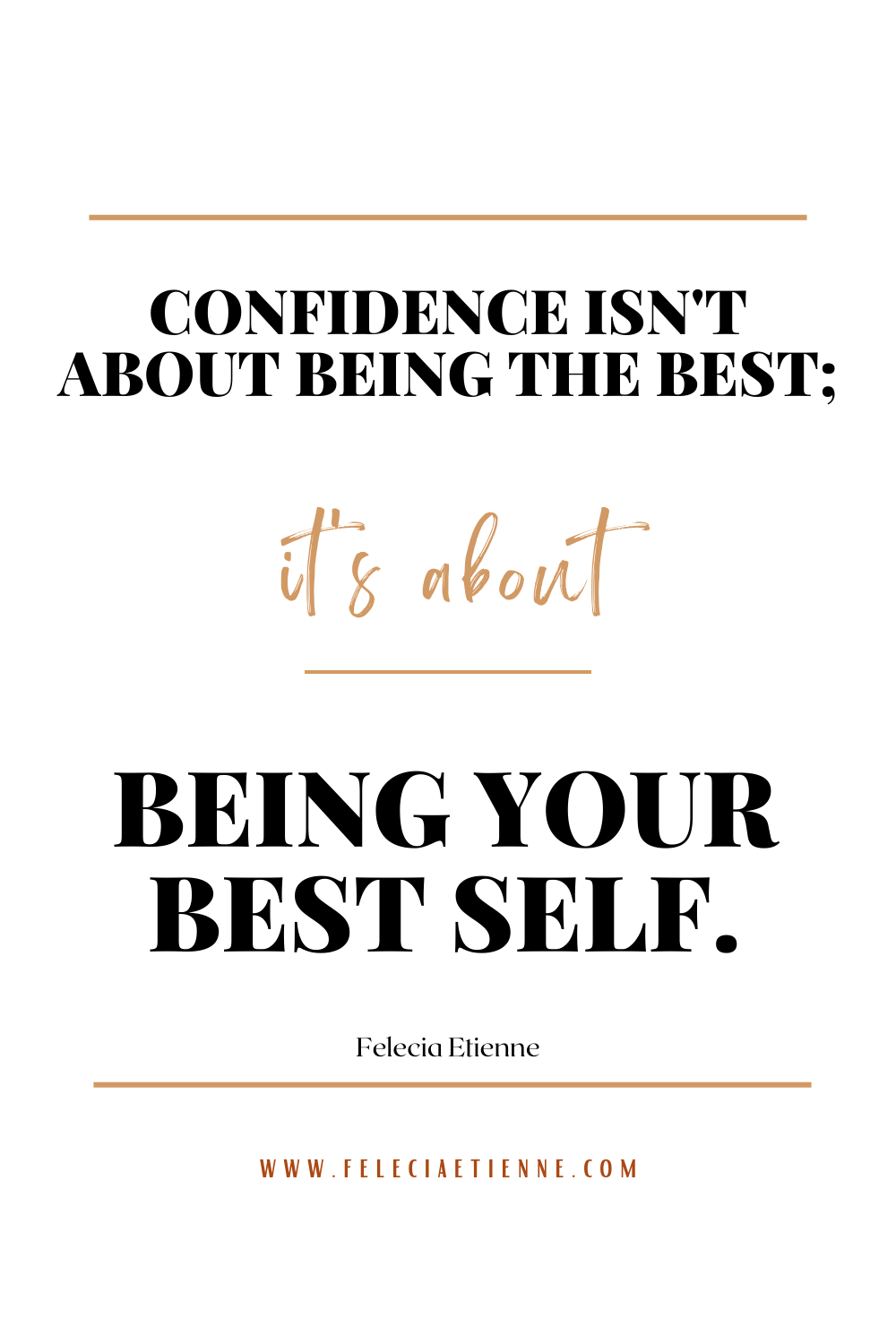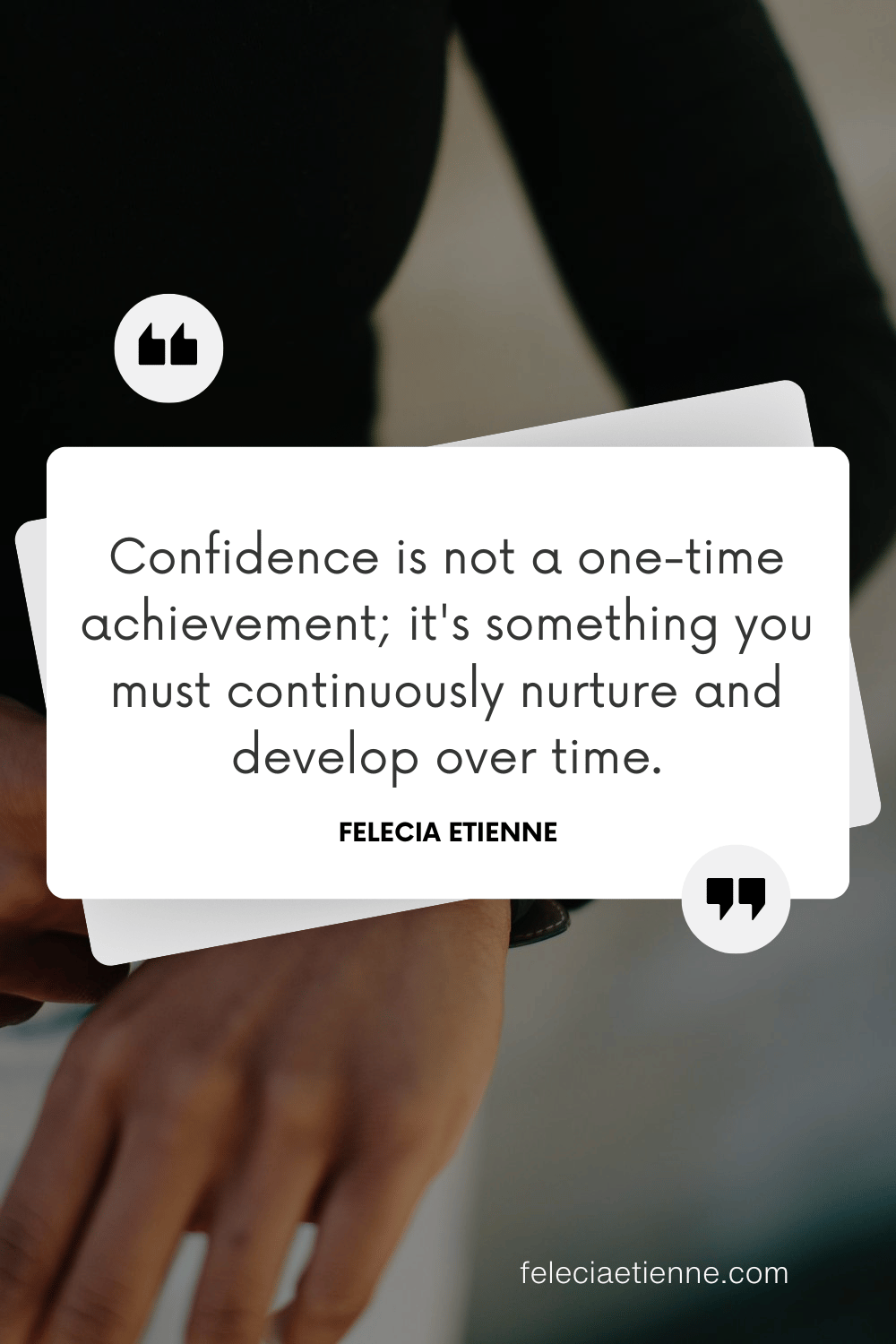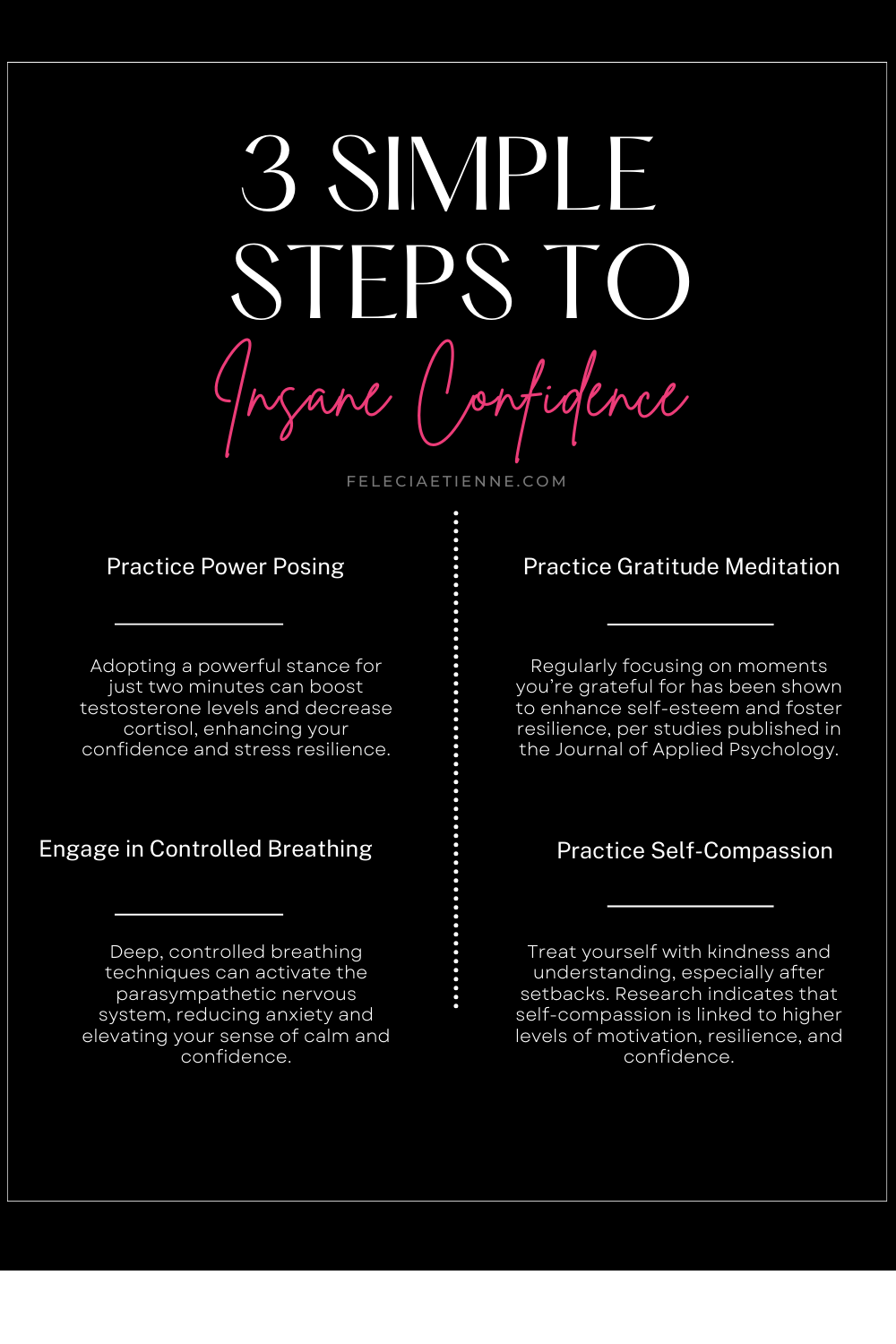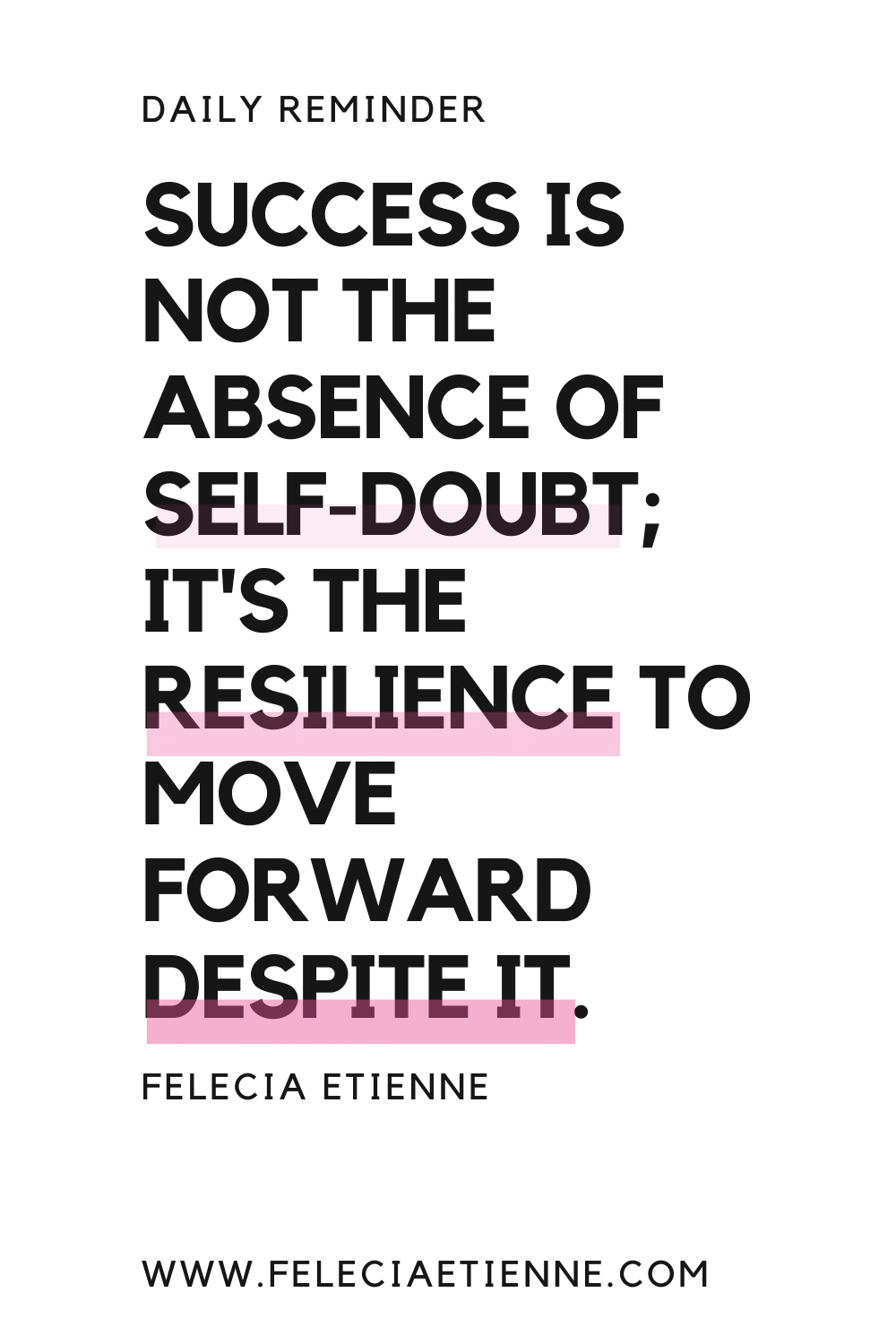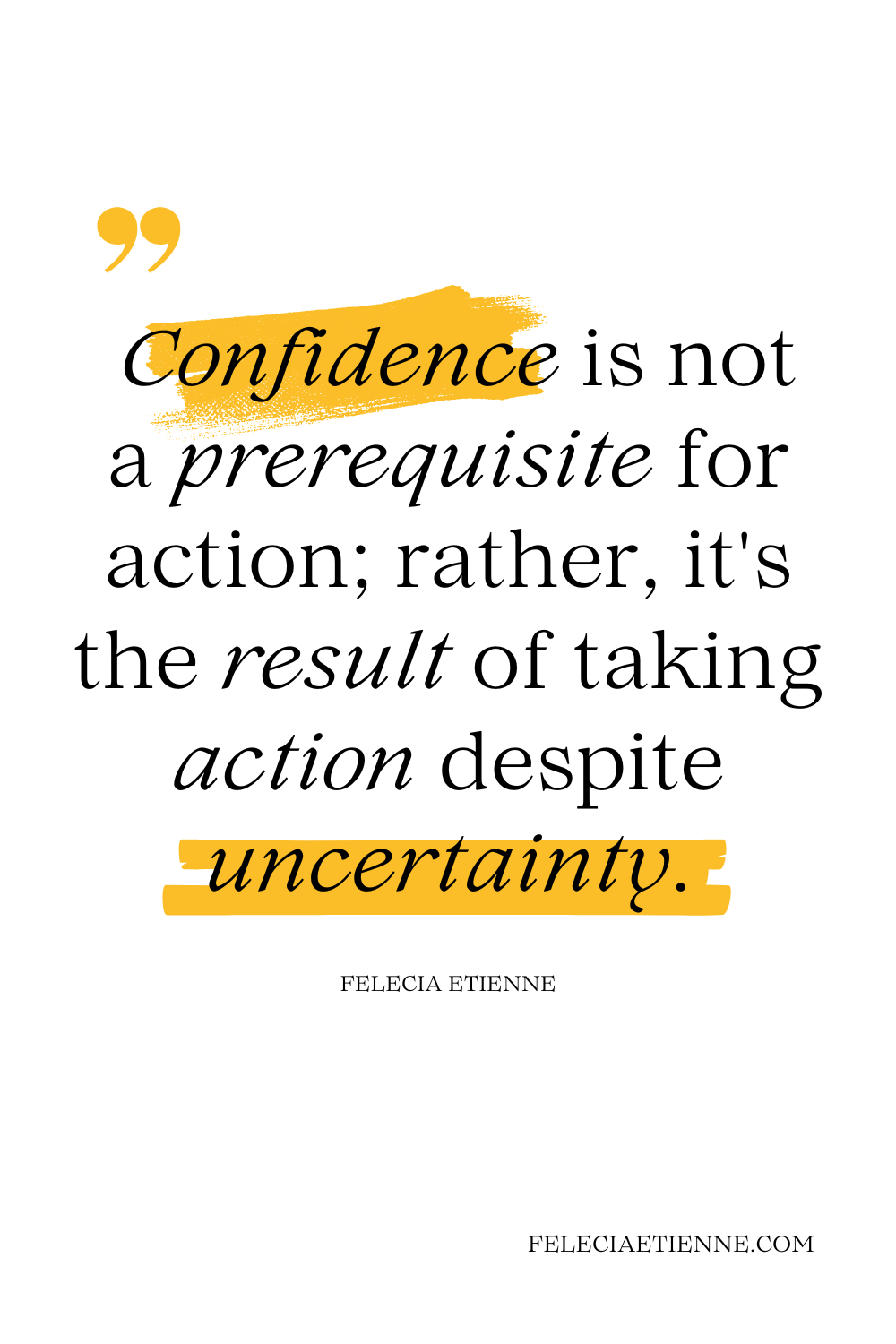The Power of Confidence: How to Build, Reinforce, and Overcome Impostor Syndrome
The Power of Confidence: How to Build it, Reinforce it, and Overcome Impostor Syndrome
Did you know that 93% of people attribute their success to confidence? It's that magic spark that earns you respect, ignites action, and leads the charge to success. Isn't it amazing how we're drawn to people who radiate confidence? They stand out in a crowd, making us feel like they have all the answers we've been searching for. It's like they're saying, "I've got you," suddenly, we're all ears, ready to soak in their wisdom. But what is confidence? And how do you cultivate this powerhouse trait within yourself? Join me on an adventure to unravel the mystery of confidence—discovering its roots and learning actionable steps to grow and maintain it. Let's dive in!
Understanding Confidence
“Embrace your inner superpower—confidence is earned through grit, experience, and persistence.”
Confidence isn't just a feel-good vibe; it's your superpower. It's knowing in your bones that you have what it takes to conquer any obstacle life throws you. Remember, confidence doesn't come with your birth certificate—it's a badge of honor you earn through grit, experience, and persistence. It's a muscle that gets tougher with every victory and every stumble. And here's the best part: it's not a fixed trait. It's fluid and dynamic, always evolving and growing with you. So, even if you're feeling a bit low on confidence right now, remember that it's just a temporary state. You have the power to build it up again, stronger than ever.
Sources of Influence
“Building self-confidence is a choice, a conscious act of owning who you are regardless of your past.”
Your confidence journey is a wild ride, sculpted by everything from childhood adventures to society's relentless push and pull and the whirlwind of media. Understanding these influences is like unlocking the secret code to unleash your true confidence superpowers. And guess what? Thanks to the discoveries in neural plasticity, you now know that rewiring your brain for more positive thoughts and actions isn't just a fantasy—it's real and can happen at any stage of life. So, no matter how shy or doubtful you've felt, embracing self-confidence is a choice you can make today. Building self-confidence is largely what psychologists call volitional. You can take control of your identity and self-esteem, regardless of past experiences or upbringing.
Childhood:
“Your childhood wounds to self-esteem may be deep, yet the strength you gain from overcoming them shapes you into a resilient adult.”
During your formative years, the people and experiences you encounter play a crucial role in shaping your self-perception. Influential figures like parents, peers, and teachers can significantly impact your self-confidence through words and actions. Negative experiences, such as constant criticism or being made to feel inadequate, can inflict deep-seated wounds that undermine your confidence into adulthood. But remember, these wounds can also be the source of your strength. They can shape you into a resilient adult, ready to face any challenge with confidence. Conversely, a supportive and nurturing environment can lay a strong foundation for self-confidence.
Religion:
“Sometimes, having the courage to question and reshape your beliefs helps you connect more deeply with yourself and everything around you.”
It was probably ingrained in you before you had the chance to explore all your options and choose one based on your logic and reasoning. For many of you, faith serves as a source of strength and guidance, giving you a sense of purpose and belonging that boosts your confidence. Religious teachings often emphasize your inherent worth and dignity, nurturing a positive self-image and resilience in adversity. However, for some of you who may not align with the beliefs of your upbringing or have had negative experiences within religious institutions, this aspect of your identity can also be a source of internal conflict and self-doubt.
Physical Appearance:
“Flawless is a myth. Being real is what truly makes you attractive.”
Your physical appearance does not reflect your worth or value as a person. It is natural to have insecurities about how you look, especially in a society that often prioritizes and idolizes certain beauty standards. However, it's important to remember that these standards are constantly changing and are usually unattainable for most people. What truly matters is how you feel about yourself and the strength and confidence you exude from within.
It's also important to recognize that everyone has unique features and characteristics that make them beautiful. Embrace your flaws; they are what make you unique and special. Remember, "flawless" is just an illusion created by societal pressures. Real beauty lies in being authentic to yourself.
Society & Culture:
““The only yardstick for success is your own happiness and fulfillment.”
Societal norms and cultural expectations significantly influence your sense of self-worth. When you constantly compare yourself to these societal yardsticks, it can either skyrocket your confidence or chip away at it bit by bit. In our hyperconnected age, social media significantly shapes your perceptions of self-worth. The curated images and lifestyles you see on platforms like Instagram can create unattainable standards of beauty and success. This often leaves you battling feelings of not being good enough and falling into the trap of endless comparisons.
Media:
“Your path to success is uniquely yours. Don’t let the noise of comparing yourself to others silence that inner voice of yours.”
The pervasive influence of advertising and media can shake your confidence by creating unrealistic standards and fostering feelings of inadequacy through constant comparison. The advertising industry thrives on creating a sense of inadequacy in you, convincing you that you need to buy products or services to feel confident and fulfilled.
This relentless exposure to advertising exacerbates feelings of self-doubt, as it crafts a gap between where you are and where you believe you should be. From beauty products promising flawless skin to fitness programs offering the perfect physique, advertisers prey on your insecurities, driving sales by highlighting this chasm. The stark contrast and comparison drawn by these advertisements injure your self-confidence, making you feel worse about yourself the more you are exposed to such messages.
Friends, Family, & Associations:
“The company you keep can either fuel your flight or anchor your dreams. Choose to fly high.”
The people you surround yourself with have a profound impact on your self-esteem and confidence levels. Choosing a supportive reference group is crucial for your personal growth and success. After 25 years of research in all aspects of human performance and achievement, David McClelland of Harvard University emphasizes that a staggering 95% of your success (or failure) hinges on the company you keep. Yes, your reference group shapes your destiny more than any other factor!
This is supported by research showing that your social circles can significantly influence your beliefs, attitudes, and behaviors. Surrounding yourself with positive, supportive individuals who believe in your abilities and encourage your aspirations can boost your confidence and help you overcome self-doubt, further underlining the critical role your environment plays in your journey toward success.
Previous Performance:
“Success and failure: just the universe’s way of teaching you to bounce back, both essential in crafting the resilience needed for lasting confidence.”
Your past successes and failures significantly impact your confidence levels. Embracing failure as part of your growth journey is crucial for developing enduring confidence. Your past experiences mold your perceptions of yourself and your capabilities. Your successes boost your confidence and sense of competence, whereas your failures might cause self-doubt and insecurity. Viewing failure as an integral part of your learning process can help you navigate setbacks and cultivate resilience.
RELATED ARTICLE: The Foundation of You: Exploring Self-Esteem, Self-Worth, and Self-Confidence for a Life of Fulfillment
Cultivating Confidence:
“Confidence isn’t just a trait you’re born with—it’s a skill you can master! It all begins the moment you start believing in yourself.”
Confidence is not a static trait; it's fluid, fragile, and situational. While your environment and past experiences can significantly influence your confidence, ultimately, building confidence starts from within. Cultivating self-confidence takes time and effort, but with consistent practice and self-reflection, it can become second nature. Cultivating confidence requires intentional effort and a willingness to push past fear and uncertainty.
Now, let's dive into the 5 phases of cultivating confidence.
Phase 1: Act Before You Have Confidence:
“Confidence is what you gain after taking action, not before.”
Understanding Fear and Its Illusions
Fear often holds us back from taking action, but it's important to remember that fear is often illusionary. Fear is an indicator telling us what we need to do. It is hard-wired into our brains, scanning for problems and projecting past pains, causing us to freeze or flee. By stepping into our fears and acting as if we're confident, we can overcome self-doubt and unlock our true potential.
The Misconception of Confidence
One of the biggest misconceptions about confidence is that you need to feel confident before taking action. In reality, it's often the other way around - taking action can actually increase your confidence. By pushing yourself to take risks and try new things, you learn that failure and mistakes are a natural part of the process and that you have the capability to handle them. This builds resilience and strengthens your confidence muscle. You have to step into it.
Conquering Fear with Action
You'll quickly realize that the fear is illusionary, merely false projections of the past that impact your ability to take action. This is because the story of fear has been passed down, and you still feel the same fear even though the reality is now irrational, a mere associated projection. The first step in building confidence is to take action, even in the face of fear. Confidence is not a prerequisite for action; rather, it's the result of taking action despite uncertainty. By stepping out of our comfort zones and confronting our fears head-on, we can build resilience and self-assurance.
Breaking Free from Fear
As Franklin D. Roosevelt said, "The only thing we have to fear is fear itself." Fear can be a self-made prison, holding you back from unlocking your true potential. When you dare to face your fears head-on and refuse to let them dictate your moves, you shatter the chains of self-doubt and insecurity, setting yourself free to soar.
Strategies to Overcome Fear
Want to conquer fear? Try the "act as if" strategy. Mimic the body language, posture, and demeanor of someone brimming with confidence. It's like a magic trick for your brain, convincing it that you're more capable and competent than you think. This nifty trick can help you bulldoze through self-doubt and boldly stride towards your goals. And here's another gem: channel your heroes. Think of the people who inspire you, absorb their courage and determination, and ask yourself, What would they do in this situation? Let their spirit guide you to greatness.
Embracing Failure and Self-Compassion
Embrace failure as a springboard to success, not a dead end. Take inspiration from Thomas Edison, who famously said, "I have not failed. I've just found 10,000 ways that won't work." See each failure as a chance to grow and learn, not as a defeat. Finally, mastering the art of self-compassion is critical to conquering fear. Mistakes and setbacks? They're part of the journey. Beating yourself up feeds your fears and insecurities. So, why not choose kindness and understanding instead? Embrace your humanity and allow yourself the grace to stride forward with confidence.
RELATED ARTICLE: Breaking Free from Self-Sabotage: Embrace Action Over Confidence
Phase 2: Develop Skills and Knowledge:
“The more you practice, the less fear will control your life.”
Embracing the Journey: The Foundation of Confidence
Identifying low self-esteem can be challenging, as it often manifests in subtle behaviors and thought patterns that may go unnoticed. Paying attention to both external cues and your internal dialogue is important to recognize the signs.
Confidence blossoms through action. Embrace the discomfort of being a beginner and push through initial struggles - that's the essence of confidence-building in any pursuit. Remember, even those excelling elsewhere might shy away from new challenges they're not initially good at; that's a roadblock. "Suc(k)" is just the start of "suc(k)cess." Embrace the journey and the challenges. Striving, learning, and growing are key components of building confidence.
The Role of Skills in Building Confidence
Your skills evolve through action and interaction. The initial stumbles are part of your journey. Skills are the bedrock of your confidence. Developing confidence requires you to have tangible skills and competencies, whether in public speaking, leadership, or technical expertise. These practical skills help you feel more capable and competent, leading to increased confidence in yourself and your abilities.
Overcoming Barriers to Confidence
One common barrier to confidence is the fear of failure. Many avoid trying new things due to fear of looking foolish or making mistakes. However, failure is an inevitable part of learning, and embracing it is essential for growth. "If there is no struggle, there is no progress," Frederick Douglass once said. Embrace the struggle and push through tough times. You'll emerge stronger and more confident on the other side.
The Path Forward: Action Mode
Start seeing challenges as chances to grow instead of roadblocks. This shift can help beat self-doubt and unlock your true potential. It's all about getting into action mode and seeing challenges as opportunities. Develop your skills, take action, and gain experience. Each step towards your goals will increase your confidence and propel you forward. Remember, confidence is not a destination but a journey that requires constant effort and self-care.
The Power of Knowledge
Boost your confidence to with knowledge and expertise! Dive deep into your chosen field or passion and master it. This journey towards expertise not only gives you a sense of competence but also supercharges your self-assurance. So, go ahead, sharpen those skills, soak up all the information you can, and expand your knowledge base. Not only will this journey amp up your confidence, but it'll also equip you to be more adaptable and resilient, ready to take on whatever changes come your way.
Phase 3: Focus on Results and Growth:
“Confidence isn’t about being the best; it’s about being your best self.”
Starting Small for Big Success
Success breeds confidence, but it's important for you to start small and track your progress. Celebrating your small victories and recognizing your growth over time is essential for maintaining your confidence.
Breaking Down Ambitious Goals
When pursuing ambitious goals, it's easy for you to become overwhelmed by the magnitude of the task ahead. However, focusing on small, achievable steps can help break the process down into manageable chunks and build momentum toward your success.
The Real Joy is in the Journey
Psychologists have found that what truly makes you happy and fulfilled is not the achievement of your goals but the progress you make toward them. Tracking your progress and cheering on your wins can really pump up your confidence and motivation to keep pushing forward.
Cultivating Happiness Through Progress
As Friedrich Nietzsche famously said, "Happiness is the feeling that your power is increasing, that resistance is being overcome, and progress is being won." By focusing on your progress and recognizing your accomplishments, you can cultivate a sense of confidence and self-assurance that propels you toward your goals.
Phase 4: Embrace Confidence as Fluid and Dynamic:
“Confidence is not a one-time achievement; it’s something you must continuously nurture and develop over time.”
Understanding Your Confidence
Your confidence levels may rise and fall based on various factors, such as external feedback, your personal experiences, and your mindset. It's important for you to understand that confidence naturally ebbs and flows, influenced by both successes and failures. Seeing your confidence as a fluid and dynamic state, rather than something static, helps you realize it's capable of growth and decline based on different factors.
Navigating Your Confidence Fluctuations
When you recognize that your confidence isn't fixed but a changing state, influenced by the people you interact with, your achievements, and how you handle adversity, you're better equipped to adapt and adjust. Your confidence isn't set in stone; it's more akin to a river, constantly changing with your mood, where you are in life, and what you've experienced. Acknowledging the mutable nature of your confidence enables you to navigate its highs and lows with grace and resilience.
Building Your Confidence Like a Muscle
Think of your confidence as a muscle; it needs regular exercise and care to remain strong. Just as maintaining physical fitness requires consistent workouts, maintaining your confidence demands active nurturing.
Boosting Confidence in Different Areas of Your Life
Your confidence can be situational; you might feel confident in some areas of your life while feeling insecure in others. By identifying your strengths and areas for improvement and focusing on where you can truly excel, you can significantly boost your confidence and shine in every aspect of your life.
Phase 5: Reinforce Your Confidence with Positive Habits:
“Confidence isn’t just about how you feel; it’s also reflected in how you act and the habits you cultivate.”
Overcoming Your Limiting Beliefs
Recognizing and challenging your own limiting beliefs is"a crucial step in improving your self-confidence. Negative self-talk often acts as a barrier to your success, shaping your perception of your abilities. To shift this mindset, start by identifying your most common negative beliefs. Then, actively counter these thoughts with evidence of your capabilities and successes. Engaging in positive affirmations and visualization techniques can also help reframe your perspective, fostering a more confident and self-assured outlook in you.
Celebrating Your Wins
Acknowledging both small and significant achievements has profound psychological benefits for you. It reinforces a positive self-perception and boosts your self-confidence. Make it a habit to celebrate your wins, maybe by writing them down in a journal, sharing them with a friend, or treating yourself to something special. These acts of self-recognition serve as reminders of your abilities and keep you motivated.
Helping Others
Supporting others in their goals and endeavors doesn't just elevate their confidence; it enhances yours as well. Acts of kindness and encouragement also change your sense of competence and worth. This could be as simple as cheering them on, dropping some know-how, or giving them a hand to reach their targets. By uplifting those around you, you create a positive cycle of confidence and support that not only makes you feel good but strengthens your connections with others.
RELATED ARTICLE: Discover True Self-Worth: 16 Strategies for Cultivating Self-Worth
Understanding Impostor Syndrome
“Success is not the absence of self-doubt; it’s the resilience to move forward despite it.”
Even the most accomplished people wrestle with self-doubt and insecurity. It's that annoying worry of being called out as a fake, even though you've been successful. Guess what? You're not alone in this battle. Seeing these feelings as part of being human and flipping them into growth opportunities can propel us beyond our limits, helping us unlock our true potential.
The Reality of Impostor Syndrome Among High Achievers
Impostor syndrome is when you feel like you're not good enough and doubt yourself, even though you've done well and have successes to show for it. It's like having this nagging worry that people will find out you're a fraud, even when you already acknowledge your achievements. Studies show that impostor syndrome hits high achievers hard, including celebs, athletes, and business leaders. Despite all their success, many of them battle doubting themselves and feeling like they're just faking it scared they'll get called out as frauds.
Turning Impostor Syndrome into an Opportunity
Embracing the discomfort of impostor syndrome and reframing it as an opportunity for growth is essential for building confidence and resilience. Rather than letting feelings of inadequacy hold you back, use them as motivation to push yourself out of your comfort zone and strive for greater success.
Inspirational Words on Self-Doubt and Success
As Maya Angelou once said, "I have written eleven successful books, but each time I think, 'Uh oh, they're going to find out now. I've run a game on everybody, and now they're going to find me out.' Even the most accomplished individuals experience moments of self-doubt and insecurity; it's how you respond to these feelings that ultimately determines your success.
“Feeling like a fraud is the secret signal that you’re doing something right. It’s the discomfort of growth urging you to push further.”
Conclusion
“ Confidence is not a prerequisite for action; rather, it’s the result of taking action despite uncertainty. ”
To wrap things up, I hope this post has made you rethink the idea that confidence is a rare treasure that's hard to find. It's not just for a lucky handful; it's a skill anyone can develop if they're ready to roll up their sleeves and get to work.
Understanding where confidence comes from, getting comfortable with being uncomfortable, and cheering on your progress is vital to unlocking your full leadership potential. Remember, being confident doesn't mean you're not scared; it means you're brave enough to move forward even when you are. So, step out confidently, armed with the know-how, skills, and abilities to reach your goals and make a positive dent in the universe.
And if you're feeling ready to elevate your self-discovery journey, I invite you to book a complimentary High-Performance Strategy Session with me. Together, we'll unlock your full potential and chase success beyond your wildest dreams. Don't let anything hold you back from being the confident leader you're meant to be. Book your session now and start a transformative growth journey like never before! Thank you for reading this blog post, and I wish you the best in your future endeavors. Remember, confidence is within your reach – all you need to do is grab it!
RELATED ARTICLE: Building Unshakeable Confidence: 19 Strategies for Cultivating Self-Confidence
“True confidence is being comfortable with who you are, even as you evolve and grow. ”
Click the freebie below to grab your free productivity powerpack:
Get Your Free High-Performance Assessment here!
Sign up to receive your Free Level-Up & Thrive Assessment.












